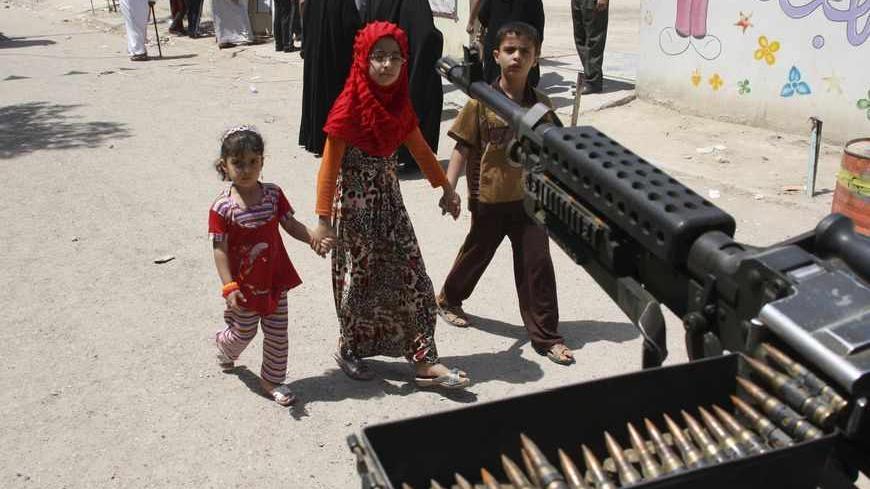In the heart of Cairo stands the al-Dhakhira Mosque, a structure built in 516 AH by Dhakhira al-Malik Ja’far, a police officer notorious for his cruelty and oppression. He would forcibly drag people off the streets, bind them, and make them work on the mosque’s construction without pay. The only workers in the mosque were those coerced into labor, with no choice but to work for free. One individual, angered by the situation, left the following verses on the mosque:
“He built a mosque for Allah without its right, and by Allah’s grace, it was unsuccessful. Like the orphan’s provider from her exhausted labor, woe to you, do not fornicate or give charity. He innovated in tormenting the wrongdoers and corrupt individuals, built a mosque with foundations of betrayal, and indeed, you were unsuccessful. Like the woman with the pomegranate who gave charity but became a symbol for the betrayer who gives charity.”
This legacy of oppression and corruption still resonates today in Iraq, a nation marred by contradictions. On one side, the political elite, clerical leaders, and Iranian-loyal factions hold power; on the other, figures like Muqtada al-Sadr, alongside al-Halbousi and Barzani, rise up, claiming to advocate for the people, lamenting their suffering, and calling for a new Iraq free from corruption. Yet their actions expose their hypocrisy. They offer minor reforms, like fixing potholes, cleaning neighborhoods, or installing streetlights, but all the while, they divert attention from the vast corruption that surrounds them. They promise reforms but continue to enrich themselves, spending $10,000 to clean a street while siphoning away $100 million from the nation’s resources, funneled into bank accounts in Lebanon, Dubai, and Iran.
The collapse of the Iraqi dinar and the surge in consumer prices have only worsened the plight of ordinary Iraqis. Seizing on the economic crisis, Muqtada al-Sadr, who presents himself as a champion of reform, has called for an end to corruption, an exposure of wrongdoers, and a reduction in the exchange rate of the dollar. He castigates the Iranian-backed factions while presenting himself as a reformist, all the while shifting blame and throwing Finance Minister Ali Allawi under the bus when things go wrong. This pattern of opportunistic populism is nothing new; it mirrors the reactionary movements that have plagued Iraq for over a quarter-century. These movements, cloaked in sectarian and religious rhetoric, continue to deepen the suffering of the Iraqi people.
Iraq’s religious establishment, with its ties to Iran, continues to oppress the masses in the name of faith. Under the guise of religious authority, it has used force and violence to silence dissent, enforcing a culture of submission while neglecting the needs of the people. The bureaucratic systems in place, suffocated by routine, have crushed the hopes and dreams of the population, leaving them to suffer under the weight of systemic corruption.
Twenty-five years have passed since the fall of Saddam Hussein’s brutal Ba’athist regime, yet Iraq has only traded one form of tyranny for another—this time, a clerical dictatorship that justifies its rule in the name of the Prophet’s family and the infallible imams. The result? A daily cycle of death, kidnapping, torture, threats, and terror, with no mercy for the innocent. In the past few days alone, 15 million people are unemployed, 5 million children are living on the streets, begging or working in menial jobs. Eight million widows and orphans remain without support or means of survival, while the lucky few receive meager social welfare payments amounting to only $80.
Children as young as four or five are forced into labor, selling bread or begging in the markets, facing abuse from their parents if they don’t meet the daily quotas. Meanwhile, four million internally displaced persons (IDPs) struggle in squalor both inside Iraq and in neighboring countries. To make matters worse, Iran-backed drug trafficking has turned Iraq into a hub for the crystal meth trade, deepening the despair and leading to an increasing number of youth suicides, often by self-immolation.
The health sector, long plagued by corruption, is in a state of collapse. Doctors neglect their patients, prescribe ineffective medications, and leave critical cases untreated. In some hospitals, patients have bled to death while staff took lunch breaks. Meanwhile, the security forces, riddled with corruption and loyalty to various political factions, have been complicit in massacres, targeting innocent civilians for financial gain. This violent reality is compounded by the government’s economic mismanagement, which continues to raise prices, devalue the Iraqi dinar, and blame a supposed empty treasury for the population’s suffering.
Muqtada al-Sadr, along with his Sunni and Kurdish allies, has played a significant role in Iraq’s downward spiral. Their empty promises of reform and justice only deepen the country’s misery. Iranian-backed political parties, much like Hezbollah in Lebanon, have exacerbated the chaos, solidifying their control over Iraq and committing horrific acts of violence. These factions, whether they call themselves reformists or defenders of the people, are all part of the same corrupt system that continues to exploit and oppress the Iraqi people.
The situation in Iraq mirrors Lebanon under Hezbollah’s control, with both countries suffering under the weight of sectarian factions vying for power. Just as Hezbollah has plunged Lebanon into chaos, the Iranian-backed forces in Iraq have ensured that the country remains trapped in a cycle of violence, corruption, and poverty. The Iraqi people, once hopeful for a better future, continue to face a grim reality as their dreams of justice, peace, and prosperity are shattered by the same corrupt elite who claim to be their saviors.
